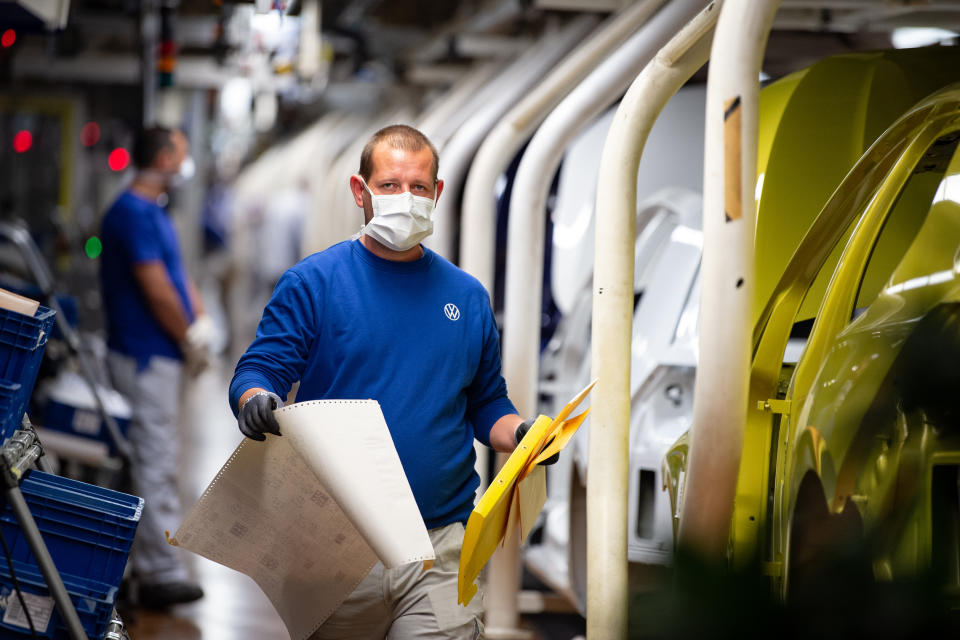Coronavirus: Carmakers struggle with collapse in demand

Just a couple of weeks after Volkswagen (VOW3.DE) reopened Europe’s biggest car plant in Wolfsburg after the coronavirus shutdown, the German car giant has idled two production lines due to a lack of customer demand.
Volkswagen’s move, first reported by AFP, underlines the main challenge for the auto industry this year: supply chains may be up and running and factories adapted to new hygiene rules, but demand is in the ditch as people shy away from expensive purchases like new cars.
“The orders are simply not there,” Ferdinand Dudenhöffer, auto industry expert at the University of St Gallen told journalists in Berlin this week. “The global economy is falling into a deep hole. Consumers lack the money and the courage to buy new cars.”
Ratings agency Moody’s this week again cut its sales forecast for the global automotive market — predicting a 20% drop in 2020, from a previous prediction of 14%.
Dudenhöffer, former co-founder and director of the Center for Automotive Research at the University of Duisburg-Essen, said that while the economic situation may be stabilising a little bit in Europe, “who in Italy, in Spain, or in France is going to buy a car?”
Spain and Italy have been the worst hit by coronavirus among European Union countries, both in terms of cases and deaths.
Germany, by comparison, has seen fewer deaths from the virus, but the nearly two-month lockdown has taken a massive toll on Europe’s largest economy, and tens of thousands of workers at Volkswagen, BMW (BMW.DE), and Daimler (DAI.DE) are still on short-time hours.
READ MORE: Coronavirus drives German GDP down by 2.2% in the first quarter
Fear of infection
With people wary of using public transport, and some governments recommending they avoid it over contagion fears, there have been suggestions that this could signal a return to commuting by car.
An online survey of 1,000 people by Autotrader found that 56% of UK driving licence holders who don’t own a car were now considering buying one, and half of them said they were less likely to use public transport.
READ MORE: The UK coronavirus lockdown has made people more likely to buy a car
However, Dudenhöffer does not believe that carmakers can expect a significant sales bump from people avoiding trains and busses. In fact, we are already at what could be described as peak car.
“We have 570 cars per 1,000 inhabitants in Germany, in America it is 850, in France it is 500 or 600… and this rate of cars-per-1,000 inhabitants has risen constantly in the past years,” Dudenhöffer said. He notes that with this already very high rate of car ownerships, “it won’t be that everyone suddenly goes out and buys a car.”
Already e-bike sales are booming, and cities like Berlin are widening bike lanes to give cyclists safer distance when passing each other. Dudenhöffer also expects Germany’s trains and public transport to “get a bit more creative and come up with innovations that allow people to take public transport and stay relatively safe.”
German auto chiefs ask for aid
With an estimated 100,000 jobs currently at risk in Germany’s economically important car industry, the country’s car bosses have been putting pressure on the federal government in Berlin to come to their aid.
Discussions are ongoing about programmes like a cash-for-clunkers and buyer incentives to stimulate sales, and a decision is expected in June.
One sticking point is that the government is being requested to shell out huge amounts of taxpayers’ money to support the car companies, who continue to pay dividends to their shareholders.
"The forecasts for 2020 are dismal," said BMW CEO Oliver Zipse at the company’s 100th AGM this week, but went on to say that it plans to distribute some €1.6bn (£1.4bn, $1.7bn) in dividends to shareholders.
“The dividend is clearly a way of sharing the company’s success with you, our shareholders,” Zipse said in his statement. “It is distributed retroactively for the prior financial year.”
Despite the dire outlook for the sector, Dudenhöffer believes that all German car brands will survive the crisis as they are relative strong compared with other carmakers. He points to Volkswagen’s healthy capitalisation and high liquidity, plus the fact that its biggest market, China, is slowly gathering speed again.

 Yahoo Finance
Yahoo Finance 